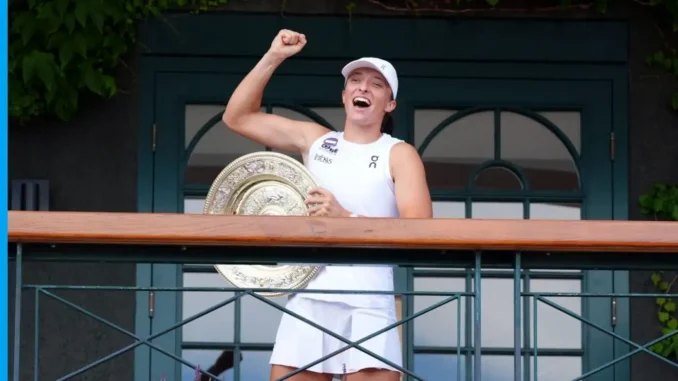
Iga Swiatek, the 24-year-old Polish tennis sensation, has solidified her status as one of the sport’s brightest stars with a remarkable 2025 season, capped by her historic Wimbledon triumph. Yet, even as she hoists her sixth Grand Slam trophy, Swiatek finds herself under a microscope, with critics seemingly poised to pounce on any misstep. The world No. 2, who has dominated women’s tennis with her aggressive all-court game and unrelenting focus, addressed the intense media scrutiny she faces, particularly in her native Poland, during an emotional press conference following her Wimbledon victory. “I’m just a human being who is trying her best,” Swiatek said, her voice tinged with frustration. “I would love for people to understand that sometimes we’re not robots, and we have our own struggles.”
Swiatek’s 2025 season has been a tale of resilience and redemption. After a tumultuous 2024, marked by a one-month doping ban due to a contaminated melatonin supplement, she entered the year ranked No. 2 and determined to reclaim her dominance. Her campaign kicked off at the United Cup, where she went undefeated in singles, defeating players like Beatriz Haddad Maia and Caroline Garcia, though Poland fell to Germany in the final. Despite early exits at the Australian Open to Madison Keys and in Doha to Jelena Ostapenko, Swiatek showed flashes of brilliance, reaching the semifinals in Dubai and Indian Wells, both times falling to rising star Mirra Andreeva. Her clay season was less dominant than her four French Open titles might suggest, with a semifinal loss to Aryna Sabalenka at Roland Garros ending her 26-match win streak in Paris. “It’s not like I’m unbeatable,” Swiatek noted. “I’ve had to work for every point, and sometimes it doesn’t go my way.”
The grass courts, historically her weakest surface, became the stage for Swiatek’s greatest triumph in 2025. At Wimbledon, she delivered a masterclass, culminating in a 6-0, 6-0 rout of Amanda Anisimova in the final—the second such scoreline in an Open Era Grand Slam final. The victory, which took just 57 minutes, marked her first Wimbledon title and made her the first Polish singles champion at the All England Club. “It’s something that is just surreal,” Swiatek told the Centre Court crowd, clutching the Venus Rosewater Dish. “I feel like tennis keeps surprising me, and I keep surprising myself.” Her path to the final included wins over Victoria Azarenka and Ekaterina Alexandrova at the Bad Homburg Open, where she reached her first grass-court final, losing to Jessica Pegula. The experience fueled her confidence, proving she could adapt her clay-heavy game to grass. “I was really competing throughout the whole two weeks,” she said, crediting her new coach, Wim Fissette, for helping her find balance between aggression and patience.
Despite her achievements, Swiatek has faced relentless criticism, particularly in Poland, where media and fans scrutinize her every move. A low point came at Indian Wells, where she hit a ball in frustration near a ball kid, prompting online backlash. In a 645-word Instagram post, Swiatek addressed the incident and the broader toll of constant judgment. “My intention was never to aim the ball at anyone but merely to release my frustration,” she wrote, noting she immediately apologized to the ball kid. “I’ve seen many players bounce balls in frustration, and frankly, I didn’t expect such harsh judgments.” She described the emotional weight of her 2024 doping saga, which saw her miss three tournaments and lose her No. 1 ranking to Sabalenka. “That’s not a healthy standard,” she added, reflecting on being labeled a “robot” when composed and “hysterical” when expressive. “Just six months ago, I felt my career was hanging by a thread, spent three weeks crying daily, and didn’t want to step on the court.”
Swiatek’s critics often focus on her perceived emotional volatility, contrasting her with the stoic demeanor expected of champions. Yet, her on-court intensity—marked by powerful topspin forehands, deft movement, and a knack for “bagel” sets—has earned her accolades from peers like Coco Gauff, who called her Wimbledon run “incredible,” and Rafael Nadal, her idol, who praised her “amazing tournament.” Her 100th Grand Slam singles win at Wimbledon and a career win percentage of 74% underscore her dominance, yet she remains a target for those who “love judging, creating theories, and imposing opinions,” as she put it. In Poland, where she’s a national hero alongside Robert Lewandowski, the pressure is magnified. “At home, they like to focus on every little thing that went wrong,” Swiatek told Sky Sports Tennis, urging fans to offer support rather than criticism.
As Swiatek prepares for the National Bank Open in Montreal, where she faces Clara Tauson on August 3, 2025, she continues to navigate a grueling tennis calendar she’s called “too intense.” Her recent win over Eva Lys in Montreal signals a return to form, but the road to the US Open will test her resilience. With a bronze medal from the 2024 Paris Olympics and a $3 million Wimbledon prize, Swiatek’s achievements are undeniable, yet she remains a champion judged by different rules. “I’m not checking what’s going on on the internet during tournaments,” she said, focusing on her game and her team. As she balances her pursuit of excellence with the weight of expectations, Swiatek’s journey is a testament to her strength, both on and off the court.
Leave a Reply